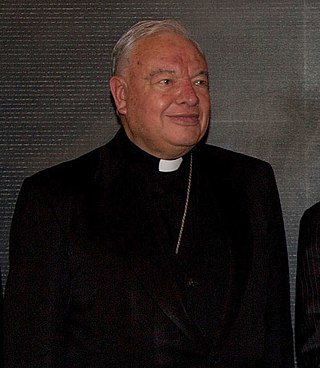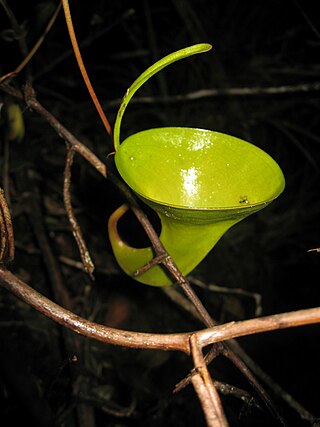Responsa comprise a body of written decisions and rulings given by legal scholars in response to questions addressed to them. In the modern era, the term is used to describe decisions and rulings made by scholars in historic religious law.

Juan Sandoval Íñiguez is a Mexican retired prelate of the Catholic Church who served as the Archbishop of Guadalajara from 1994 to 2011. He was made a cardinal by Pope John Paul II in 1994.
In binomial nomenclature, a nomen dubium is a scientific name that is of unknown or doubtful application.

Nepenthes dubia is a tropical pitcher plant endemic to the Indonesian island of Sumatra, where it grows at an altitude of 1600–2700 m above sea level. The specific epithet dubia is the Latin word for "doubtful".

Nepenthes tenuis is a tropical pitcher plant endemic to the Indonesian island of Sumatra. The species was first collected in 1957, from a remote mountain in the western part of the island. It remained undescribed until 1994, and was only rediscovered in the wild in 2002. Prior to this, N. tenuis was known solely from a single photograph and dried herbarium specimen.

Nepenthes inermis is a tropical pitcher plant endemic to the Indonesian island of Sumatra. The specific epithet inermis is Latin for "unarmed" and refers to the upper pitchers of this species, which are unique in that they completely lack a peristome.

Nepenthes izumiae is a tropical pitcher plant endemic to Sumatra, where it grows in montane forest at 1700–1900 m above sea level. It appears to be most closely related to N. lingulata and N. singalana.

Nepenthes × pyriformis is a natural hybrid involving N. inermis and N. talangensis. It is known only from Mount Talang in Sumatra, to which N. talangensis is endemic. Nepenthes talangensis was only described as a distinct species in 1994. Prior to this it was placed within N. bongso and some of the older literature identifies this hybrid as N. bongso × N. inermis.

Clausilia dubia is a species of small, very elongate, left-handed air-breathing land snail, a sinistral terrestrial pulmonate gastropod mollusk in the family Clausiliidae, the door snails, all of which have a clausilium.

Praya dubia, the giant siphonophore, lives in the mesopelagic zone to bathypelagic zone at 700 m (2,300 ft) to 1,000 m (3,300 ft) below sea level. It has been found off the coasts around the world, from Iceland in the North Atlantic to Chile in the South Pacific.

Blaptica dubia, the dubia roach, orange-spotted roach, Guyana spotted roach, or Argentinian wood roach, is a medium-sized species of cockroach which grows to around 40–45 mm (1.6–1.8 in).
Kouan-Houlé is a town in the far west of Ivory Coast. It is a sub-prefecture of Danané Department in Tonkpi Region, Montagnes District.
Téapleu is a town in the far west of Ivory Coast. It is a sub-prefecture of Zouan-Hounien Department in Tonkpi Region, Montagnes District.
Dubia is a plural of the Latin word dubium and may refer to:

The dubious dtella, native Australian house gecko, or dubious four-clawed gecko is a species of gecko in the genus Gehyra, native to Northeastern Australia. The lizard is found in a variety of habitats, including acacia and eucalyptus woodlands, and in human-developed habitats, such as house walls in urban areas. Its urban presence makes it known as a common house gecko in Queensland. These geckos are often confused with the Asian common house gecko, which was introduced to Australia from Indonesia, but G. dubia has distinct rounded feet and quieter calls.

Walter Brandmüller is a German prelate of the Catholic Church, a cardinal since 2010. He was president of the Pontifical Committee for Historical Sciences from 1998 to 2009.

Hemilophini is a tribe of longhorn beetles of the subfamily Lamiinae.

Zeale is a genus of flat-faced longhorns in the beetle family Cerambycidae. There are at least four described species in Zeale, found in Central and South America.

Zeale nigromaculata is a species of beetle in the family Cerambycidae. It was described by Johann Christoph Friedrich Klug in 1829. It is known from Argentina, Brazil, Paraguay, and Uruguay.

Zeale scalaris is a species of beetle in the family Cerambycidae. It was described by Francis Polkinghorne Pascoe in 1866. It is known from Colombia, Ecuador, Panama and Peru.













